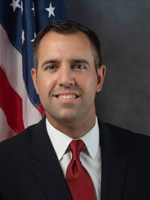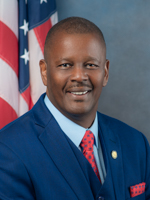Thanks to decades of tough-on-crime policies, Florida now has the third-largest prison population in the United States — nearly 100,000 people, including more minors than any other state. Florida requires people to serve at least 85 percent of their sentences and has abolished parole. All this costs taxpayers $2.4 billion per year.
In the 1980s and 1990s, the crack epidemic, combined with fears about a new breed of juvenile “superpredators,” sent the state on a jailing spree. But could 2019 be a turning point? With escalating incarceration costs and evolving public sentiment, both Republicans and Democrats have voiced support for at least modest changes.
Florida began its annual 60-day legislative session on Tuesday. Which bills will evaporate and die? And which will turn into statutes?

Florida House of Representatives
Juan Fernandez-Barquin
Juan Fernandez-Barquin, a freshman legislator from Miami, personifies the narrowing divide on criminal justice matters: He’s a Republican, but also a former public defender who has seen the system from the inside.
“When it comes to criminal justice reform, I think we’ve turned the corner on it,” he said. “You see that with Amendment 4 [which let ex-felons have the right to vote upon completion of their sentences] having passed.” (It went into effect this January.)
“There’s a general feeling that something has to be done. Locking someone in a cage is a severe penalty, and I think slowly people are realizing this. After the war on drugs in the ’90s — we’re swinging back from that, like a pendulum.”

Florida House of Representatives
James Bush III
Rep. James Bush III, a Democrat from Miami, called criminal justice reform “an idea whose time has come,” calling it not a matter of partisanship dealmaking, but rather of right and wrong.
“It’s like when a child comes forth in the world,” Bush said. “After a period of nine months, it’s time to bring the child forth. This is the right timing.”
Reformers’ goals can be divided into three categories: having fewer children incarcerated, dismantling harsh sentencing laws and steering lawbreakers toward job or rehabilitation programs instead of prison.
Keeping youth out of jails
In Florida, prosecutors have a lot of power when a minor is charged with a crime, thanks to prosecutorial discretion or direct file.
Currently, it’s mandatory that defendants aged 16 or 17 are transferred to adult courts for any charge considered a forcible offense (murder, manslaughter, sexual battery, etc.) or if the minor has committed three felonies in 45 days.
In other instances, prosecutors use discretionary direct file, meaning they can bring the charges in adult court if they so choose. The youth has no chance to dispute the decision or have it reviewed by a judge. Juveniles can also end up in adult court if they waive juvenile court or if a grand jury indicts them — but 98 percent of the time, they are there because of the prosecutor’s decision.
According to the American Civil Liberties Union, Florida prosecutes more children in adult courts than any other state in the country — more than 7,600 minors since 2011, most for nonviolent offenses.
“These kids are even as young as — check this out — 10 years old,” said Bush, who has filed a bill to modify the process.
Scott McCoy, senior policy counsel in Florida for the Southern Poverty Law Center, said efforts to reform direct file failed in the past in part because the bills proposed too many changes in a single bill.
This time, proposed reforms have been broken up into three different bills:
Bush’s HB 575, which has a companion bill, SB 876, in the Senate, would allow a child to have an evidentiary hearing. “This creates a chance for kid in front of an adult court to say, ‘I’m not terrible! Here are my facts and circumstances. Send me back to juvenile court and and deal with me there.’ That is the main bill I would like to see passed,” McCoy said.
SB 870 would keep kids out of adult facilities while they are awaiting trial, and SB 850/HB 339 would “raise the floor” on prosecuting very young kids, McCoy said.
“That bill makes 14- and 15-year-olds ineligible for direct file,” he said. “And for 16- and 17-year-olds, it limits it to violent felonies rather than any felony and eliminates mandatory direct file.” And it specifies that “if a kid is younger than 14, you can’t indict him.”
The SPLC has joined with more than two dozen other groups to create a coalition called “No Place for a Child” and lobby for these reforms. The organizations include ACLU of Florida, Florida Council of Churches and the Florida Public Defender Association. They will be coordinating a lobbying day in Tallahassee March 13.
Bush, a retired teacher who at age 13 attended Martin Luther King Jr.’s funeral, sees the matter as a civil rights issue. The current system is biased against kids of color.
“Seventy-six percent of youth charged as adults are black,” he said. For comparison, just over 20 percent of Miami-Dade’s schoolchildren are black. Of the inherent disparity in numbers, he said, “It is un-American. It is criminal.”
Another bill would allow judges to consider anyone under 21 who commits a felony a “youthful offender.” And HB 755 would prohibit youth from being placed in solitary confinement.
Undoing tough sentencing measures
Modeled after the federal First Step Act that passed in December, the Florida First Step Act (SB 642) would affect adults. Introduced by Republican Sen. Jeff Brandes of Pinellas County, who is vice chair of the criminal justice committee, it would give judges discretion to divert people from mandatory minimum sentences in nonviolent drug offenses. It would also house inmates in facilities within 150 miles from their homes and slice 60 days off sentences for offenders who take on coursework or learn a trade.
“These are best practices from around the country," Brandes told the Capitol News Service.
With 24 percent of state inmates over age 50 and health care eating up nearly 20 percent of the budget of the Department of Corrections, Brandes’ proposal calls for “conditional medical release” and would allow inmates to be released early if they are sick and have little chance of reoffending.
However, Gov. Ron DeSantis, a former prosecutor, told the Capitol News Service he’s hesitant to pass it at the state level even though he voted for the federal version of the legislation when he was a U.S. congressman.
“The character of the crimes are a lot different. I mean, the federal tends to be drug trafficking, there's a lot of white collar [crimes]. The state, you have a lot more violent crimes,” DeSantis said.
Similarly, HB 607 would expand eligibility for conditional medical release to include inmates with debilitating illnesses. HB 963 would give probation officers leeway in penalizing people for technical probation violations. And HB 919 provides for community courts to address misdemeanors.
Rehabilitate instead of punish
The Florida Campaign for Criminal Justice Reform is pushing SB 734, which would remove driver license suspensions as punishment for certain offenses, such as failure to pay court fees, drug-related offenses or misdemeanor theft, which for minors includes vandalism, truancy and tobacco-related offenses)
It’s also pushing SB 394 and HB 667, companion bills that would limit the number and types of convictions that can affect occupational licensure, as about 30 percent of Florida jobs require some kind of licensing.
Another bill, HB 953, would require the Department of Corrections to provide more transition specialists and employment specialists.
Other bills up for consideration this session include the "Dignity for Incarcerated Women Act," a state version of a popular federal initiative that would provide female inmates with hygiene products and prohibit men from doing pat-downs or body cavity searches of them. Another bill would raise the threshold for felony theft charges, from $300 to $1000.
The Southern Poverty Law Center is tracking dozens of 2019’s Florida criminal justice bills here.

To all concerned parties advocating Florida prison reform
especially those involved youth juvenille offenders:
Hello,
My name is Kim Knight and Danny Knight, inmate number R65065, is my nephew.
He was sentenced to 40 years for his very first non violent offense when he was 17 years old.
this was his first charge EVER, unless you count his citation for riding a bicycle without
a helmet when he was 12.
He has been locked up since 03/08/2011.
His parents were in the process of going thru a nasty divorce (i have enclosed that
so you can see the dates) and he was just being a pissed off dumb kid and running with the wrong bunch. There was no intervention, there were no volunteer hours offered, there was nothing, until a few months ago when the state’s attorney decided to revisit his sentencing
and then for whatever reason, (around Nov. 6th, 2018) they decided to wait and see how the court ruled on the other juvenille cases that were coming up in front of them.
This is horrifically tragic and very wrong. I have enclosed the rap sheet of a man named Matthew Slaton, DC number 122154, who was locked up for 15 years for aggravated battery
and a seperate charge of 2nd degree murder. He served his time and is now a free man.
How does this even happen?
please do what you can for Danny, use him as an example, make him your poster boy.
He is a good kid that screwed up one time and had his life blow up. He wants you to please contact him direct if you have any questions or ideas.
thank you kindly,
Kimberlee knight
saedydog@windstream.net
Deirdra, outstanding article and research! How can I subscribe to your feed outlets?